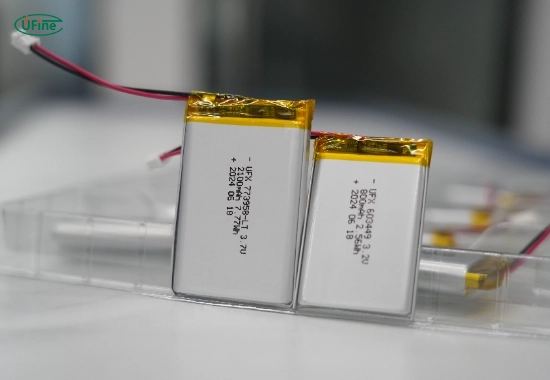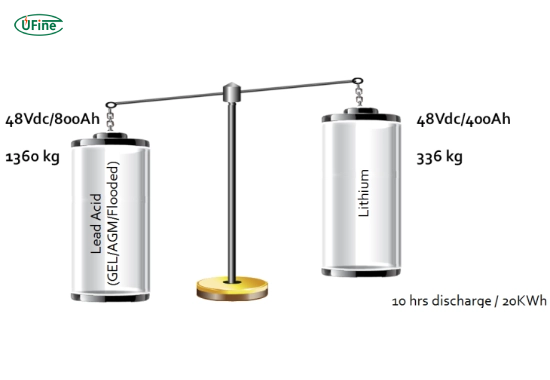
- Part 1. What is a lithium battery?
- Part 2. Why does lithium battery weight matter?
- Part 3. What affects lithium battery weight?
- Part 4. Understanding the relationship between battery capacity (Ah) and discharge rate (C-rating) on weight
- Part 5. Lithium battery weight by size
- Part 6. How does lithium compare to lead-acid in weight?
- Part 7. Lithium battery weight by application
- Part 8. Why are lithium batteries lighter?
- Part 9. Do lithium batteries lose weight over time?
- Part 10. Lightweight lithium battery brands to consider
- Part 11. FAQs about lithium battery weight
When asked how much a lithium battery weighs, the answer depends on several factors, such as the battery’s capacity, voltage, chemistry, and design. However, the key takeaway is that lithium batteries are significantly lighter than traditional lead-acid batteries while offering better performance and a longer lifespan.
For example, a 12V 100Ah lithium battery typically weighs around 25 to 30 pounds, whereas a comparable lead-acid battery can weigh upwards of 60 to 70 pounds. This weight difference is critical in applications where space, efficiency, and mobility are important, such as in RVs, marine vehicles, and solar energy systems.
This article provides a comprehensive, size-by-size breakdown of lithium battery weight, helping you confidently choose the right battery for your application.
Part 1. What is a lithium battery?
A lithium battery is a type of rechargeable battery that uses lithium ions to store and release energy. These batteries are known for their high energy density, long cycle life, low self-discharge, and most importantly, their lightweight construction.
Unlike lead-acid batteries, lithium batteries do not use heavy metal plates or water. Instead, they rely on advanced materials such as lithium iron phosphate (LiFePO4), which is stable, safe, and efficient.
Lithium batteries are used in a wide range of devices and platforms, from mobile phones and laptops to electric vehicles, RVs, solar systems, and boats.
Part 2. Why does lithium battery weight matter?
The weight of a lithium battery plays a critical role in many applications. In vehicles such as RVs, boats, and electric bikes, every pound affects handling, efficiency, and safety. In off-grid and mobile solar systems, lighter batteries make installation and transportation much easier.
Here are a few reasons why battery weight is important:
- Improved fuel efficiency in vehicles
- Easier installation and handling
- Lower structural stress on platforms
- Greater portability in mobile or temporary setups
Choosing a lighter battery without sacrificing performance can make a huge difference in daily use and long-term maintenance.
Part 3. What affects lithium battery weight?
Several elements influence the weight of a lithium battery. Understanding these will help you make smarter decisions when selecting a battery:
Battery Capacity (Ah)
A battery’s ampere-hour rating (Ah) represents how much energy it can store. A higher Ah rating means the battery can deliver more current over time, but it also requires more internal cells, which add weight.
For instance:
- A 12V 50Ah battery may weigh about 13 pounds
- A 12V 100Ah battery can weigh up to 30 pounds
- A 12V 200Ah battery might weigh over 55 pounds
Battery Voltage (V)
Higher voltage batteries, such as 24V or 48V, are often used in larger systems. These batteries may have the same Ah rating but will weigh more due to the additional cell configurations required to reach the higher voltage.
Battery Chemistry
Different lithium chemistries have different energy densities. The most common types include:
- LiFePO4 (Lithium Iron Phosphate) – Stable and safe, but heavier
- NMC (Nickel Manganese Cobalt) – Higher energy density, lighter, but more sensitive to temperature
LiFePO4 is widely used for off-grid, RV, and marine applications because of its thermal stability and long cycle life, even though it is slightly heavier.
Battery Casing
The material of the casing also affects weight. Batteries with metal casings are more durable but heavier, while those with plastic casings are lighter but may offer less protection.
Built-in Features
Some lithium batteries include Battery Management Systems (BMS), heating elements for cold climates, or Bluetooth monitoring. These add convenience and safety but also contribute to the overall weight.
Part 4. Understanding the relationship between battery capacity (Ah) and discharge rate (C-rating) on weight
The C-rating of a lithium battery, or discharge rate, tells you how fast the battery can deliver its stored energy. A higher C-rating means the battery can supply energy at a faster rate, which is important for high-power applications.
How it affects weight:
- High C-rate batteries are built with more robust internal components to handle higher current without overheating or degrading.
- This means they often have thicker electrodes, better thermal management, and reinforced casing.
- As a result, even two batteries with the same Ah rating can have different weights if one has a much higher C-rating.
For example:
- A 12V 100Ah battery with a 1C rating may weigh 25 pounds
- A 12V 100Ah battery with a 3C rating may weigh 28 to 30 pounds
If your application requires high power in short bursts, such as power tools, electric vehicles, or inverters, a battery with a higher C-rating is essential, but expect it to weigh slightly more.
Part 5. Lithium battery weight by size
Let’s look at typical lithium battery weights based on their capacity and voltage:
| Battery Size (Ah) | Voltage (V) | Average Weight (lbs) | Weight (kg) |
|---|---|---|---|
| 10Ah | 12V | 2.2 to 3.5 lbs | 1 to 1.6 kg |
| 20Ah | 12V | 4.4 to 5.5 lbs | 2 to 2.5 kg |
| 50Ah | 12V | 11 to 15 lbs | 5 to 6.8 kg |
| 100Ah | 12V | 25 to 30 lbs | 11.3 to 13.6 kg |
| 200Ah | 12V | 45 to 60 lbs | 20.4 to 27.2 kg |
| 100Ah | 24V | 40 to 48 lbs | 18 to 22 kg |
| 100Ah | 48V | 85 to 110 lbs | 38 to 50 kg |
These values vary slightly by brand and features but provide a solid benchmark for planning.
Part 6. How does lithium compare to lead-acid in weight?
Lithium batteries are much lighter than lead-acid batteries. Here’s a side-by-side comparison to show the contrast:
| Capacity | Lithium (lbs) | Lead-Acid (lbs) |
|---|---|---|
| 100Ah | 25 to 30 | 60 to 70 |
| 200Ah | 45 to 60 | 115 to 130 |
The lighter weight of lithium batteries not only improves mobility and efficiency but also reduces the stress on structural components in vehicles and installations.
Part 7. Lithium battery weight by application
RVs and Campers
Most RV users prefer 12V 100Ah lithium batteries, which weigh around 25 to 30 pounds. Depending on your power needs, you may install multiple batteries in parallel.
Marine Use
Boats benefit greatly from the reduced weight of lithium batteries. A 12V 50Ah battery is light enough to carry by hand and potent enough for trolling motors.
Solar Power Systems
For home or off-grid solar energy, 24V or 48V lithium batteries are common. A 48V 100Ah battery can weigh up to 110 pounds, but it’s still lighter than several lead-acid batteries combined.
Portable Power Stations
These systems use small lithium packs, typically under 10 pounds, and are ideal for camping, emergency power, or mobile workstations.
Part 8. Why are lithium batteries lighter?
The reason lithium batteries are so light lies in their chemical makeup. Lithium, the lightest metal, allows for high energy storage in a small mass. Unlike lead-acid batteries, which use heavy lead plates and liquid electrolytes, lithium batteries use compact cells and solid components, making them:
- Smaller in size
- Lighter in weight
- More efficient in energy delivery
This is why lithium technology is the top choice in modern applications.
Part 9. Do lithium batteries lose weight over time?
No. Lithium batteries do not lose physical weight as they age. While their capacity may degrade after many cycles, the weight remains unchanged. If a battery appears lighter, it could be due to internal damage or air pocket formation, and a professional should inspect it.
Part 10. Lightweight lithium battery brands to consider
Here are some trusted brands known for producing lightweight and high-performance lithium batteries:
- Ufine Battery: A rising brand that offers high-quality, lightweight lithium batteries for industrial and personal use. Known for innovation and safety, Ufine provides competitive pricing and efficient energy solutions.
- Battle Born Batteries: Made in the USA. Known for consistent performance and a 10-year warranty. Their 12V 100Ah model weighs around 31 pounds.
- Renogy: Popular for solar systems. Their 100Ah lithium battery weighs about 26 pounds.
- LiTime (formerly Ampere Time): Affordable and reliable. Their 100Ah battery weighs around 24.25 pounds.
- Victron Energy: Premium brand with smart features and advanced BMS. Slightly heavier but very durable.
Always compare the specifications, warranty, and C-rating before making a purchase decision.
Part 11. FAQs about lithium battery weight
How much does a 100Ah lithium battery weigh?
A typical 12V 100Ah lithium battery weighs between 25 and 30 pounds, depending on design and features.
Are lithium batteries lighter than lead-acid?
Yes. Lithium batteries are usually 50 to 70 percent lighter than lead-acid batteries of the same energy capacity.
Does battery voltage affect weight?
Yes. A 48V 100Ah lithium battery will weigh significantly more than a 12V 100Ah because it contains more internal cells and components.
What is the impact of C-rating on battery weight?
Higher C-ratings mean the battery can discharge faster, but this requires stronger internal components, which adds to the overall weight.
Can I carry large lithium batteries on a plane?
No. Most large lithium batteries, such as 100Ah or above, exceed the 100Wh airline limit and are not allowed on passenger flights.
Related Tags:
More Articles

A Complete Guide to the Best Batteries for Flashlights
Compare the best batteries for flashlights, including AA, AAA, 18650, 21700, CR123A. See which battery offers the best brightness, runtime, and reliability.
How Long Do Rechargeable AA Batteries Last?
How long do rechargeable AA batteries last? Compare NiMH and lithium AA lifespan, recharge cycles, key factors, and performance vs alkaline batteries.
How Much Current Can a 9V Battery Really Supply?
Discover how many amps a 9V battery can supply, its actual current output, discharge rate, and capacity for alkaline, lithium, and rechargeable 9V batteries.
12V STD vs 12V AGM: Meaning, Differences, and Which Is Better
Understand what STD and AGM batteries mean, their key differences, and which 12V battery fits your needs best in 2026.
Battery Reconditioning Explained: A Comprehensive Guide
Learn what battery reconditioning is, how it works, how long it takes, and when reconditioning chargers are used for lead-acid and lithium-ion batteries.




